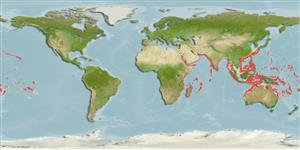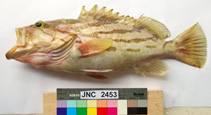Epinephelus morrhua (Valenciennes, 1833)
Comet grouper
Add your observation in Fish Watcher
| Native range | All suitable habitat | Point map | Year 2050 |

|
| This map was computer-generated and has not yet been reviewed. |
| Epinephelus morrhua AquaMaps Data sources: GBIF OBIS |
Upload your photos and videos
Pictures | Google imageEpinephelus morrhua
Picture by Justine, J.-L.
Pictures | Google imageEpinephelus morrhua
Picture by Justine, J.-L.
Classification / Names Common names | Synonyms | Catalog of Fishes(genus, species) | ITIS | CoL | WoRMS | Cloffa
Teleostei (teleosts) > Perciformes/Serranoidei (Groupers) > Epinephelidae (Groupers)
Etymology: Epinephelus: Greek, epinephelos = cloudy (Ref. 45335).
More on author: Valenciennes.
Etymology: Epinephelus: Greek, epinephelos = cloudy (Ref. 45335).
More on author: Valenciennes.
Environment: milieu / climate zone / depth range / distribution range Ecology
Marine; reef-associated; non-migratory; depth range 80 - 370 m (Ref. 5222). Tropical; 31°N - 31°S, 30°E - 134°W (Ref. 5222)
Distribution Countries | FAO areas | Ecosystems | Occurrences | Point map | Introductions | Faunafri
Indo-Pacific: Red Sea and East Africa to the central Pacific. Epinephelus poecilonotus, Epinephelus radiatus, and Epinephelus tuamotoensis are sometimes referred to as this species.
Size / Weight / Age
Maturity: Lm ? range ? - ? cm
Max length : 90.0 cm TL male/unsexed; (Ref. 2871); common length : 60.0 cm TL male/unsexed; (Ref. 9137); max. published weight: 6.7 kg (Ref. 40637)
Max length : 90.0 cm TL male/unsexed; (Ref. 2871); common length : 60.0 cm TL male/unsexed; (Ref. 9137); max. published weight: 6.7 kg (Ref. 40637)
Short description Identification keys | Morphology | Morphometrics
Dorsal spines (total): 11; Dorsal soft rays (total): 14 - 15; Anal spines: 3; Anal soft rays: 7 - 8. Distinguished by the following characteristics: head and body tan, with dark brown bands: bifurcate band that begins at rear edge of eye, upper branch extending to a dark brown saddle blotch on the nape just in front of dorsal fin, lower branch running to lower opercular spine and continuing on body as midlateral band that bifurcates above the pectoral fin, upper branch of this band running to a dark blotch at the base of 3rd to 7th dorsal fin rays; dark band from the upper edge of the operculum to base of 5th to 9th dorsal fin spines; narrow band from lower edge of eye to pectoral fin base, continued as broken band along lower part of body and curving up to the dorsal part of peduncle; broad band from maxillary groove to posterior end of interopercle; small dark brown spots often present in the pale areas between bands; depth of body contained 2.8-3.1 times in SL; head length 2.3-2.5 times in SL; flat to moderately convex interorbital area, dorsal head profile slightly convex; shallow indentation on preopercle just above the enlarged serrae at the angle; upper edge of operculum almost straight; maxilla reaches to or past vertical at rear edge of eye; 2 rows of teeth on midlateral part of lower jaw (Ref. 89707).
Found in deep waters from 80-370 m on slopes of islands, sea mounts or continental shelves. Feeds on benthic fishes and large invertebrates (Ref. 89707). Considered rare in Tahiti but quite common in atolls (Ref. 4821). The species is easily confused with E. poecilonotus, E. radiatus, or E. tuamotuensis, three closely related deep-water groupers. Known to be ciguatoxic at Mauritius. Uncommon in local markets (probably due to it deep-water habitat).
Life cycle and mating behavior Maturity | Reproduction | Spawning | Eggs | Fecundity | Larvae
Main reference
Upload your references | References | Coordinator | Collaborators
Heemstra, P.C. and J.E. Randall, 1993. FAO Species Catalogue. Vol. 16. Groupers of the world (family Serranidae, subfamily Epinephelinae). An annotated and illustrated catalogue of the grouper, rockcod, hind, coral grouper and lyretail species known to date. Rome: FAO. FAO Fish. Synop. 125(16):382 p. (Ref. 5222)
IUCN Red List Status (Ref. 130435: Version 2024-2)
Least Concern (LC) ; Date assessed: 22 November 2016
CITES
Not Evaluated
Threat to humans
Reports of ciguatera poisoning (Ref. 5222)
Human uses
Fisheries: minor commercial; gamefish: yes
FAO - Fisheries: landings; Publication: search | FishSource | Sea Around Us
More information
Population dynamics
Growth parameters
Max. ages / sizes
Length-weight rel.
Length-length rel.
Length-frequencies
Mass conversion
Recruitment
Abundance
Growth parameters
Max. ages / sizes
Length-weight rel.
Length-length rel.
Length-frequencies
Mass conversion
Recruitment
Abundance
Life cycle
Reproduction
Maturity
Maturity/Gills rel.
Fecundity
Spawning
Spawning aggregations
Eggs
Egg development
Larvae
Larval dynamics
Reproduction
Maturity
Maturity/Gills rel.
Fecundity
Spawning
Spawning aggregations
Eggs
Egg development
Larvae
Larval dynamics
Physiology
Body composition
Nutrients
Oxygen consumption
Swimming type
Swimming speed
Visual pigments
Fish sound
Diseases & Parasites
Toxicity (LC50s)
Body composition
Nutrients
Oxygen consumption
Swimming type
Swimming speed
Visual pigments
Fish sound
Diseases & Parasites
Toxicity (LC50s)
Genetics
Genetics
Heterozygosity
Heritability
Genetics
Heterozygosity
Heritability
Human related
Aquaculture systems
Aquaculture profiles
Strains
Ciguatera cases
Stamps, coins, misc.
Aquaculture systems
Aquaculture profiles
Strains
Ciguatera cases
Stamps, coins, misc.
Tools
E-book | Field guide | Identification keys | Length-frequency wizard | Life-history tool | Point map | Classification Tree
| Catch-MSY |
Special reports
Download XML
Internet sources
AFORO (otoliths) | Aquatic Commons | BHL | Cloffa | BOLDSystems | Websites from users | Check FishWatcher | CISTI | Catalog of Fishes: genus, species | DiscoverLife | ECOTOX | FAO - Fisheries: landings; Publication: search | Faunafri | Fishipedia | Fishtrace | GenBank: genome, nucleotide | GloBI | Google Books | Google Scholar | Google | IGFA World Record | MitoFish | National databases | Otolith Atlas of Taiwan Fishes | PubMed | Reef Life Survey | Socotra Atlas | Tree of Life | Wikipedia: Go, Search | World Records Freshwater Fishing | Zoological Record
Estimates based on models
Preferred temperature (Ref. 123201): 14.2 - 23.1, mean 19 °C (based on 305 cells).
Phylogenetic diversity index (Ref. 82804): PD50 = 0.5000 [Uniqueness, from 0.5 = low to 2.0 = high].
Bayesian length-weight: a=0.01318 (0.00806 - 0.02156), b=3.03 (2.90 - 3.16), in cm total length, based on LWR estimates for this species & Genus-body shape (Ref. 93245).
Trophic level (Ref. 69278): 4.0 ±0.65 se; based on food items.
Generation time: 5.0 ( na - na) years. Estimated as median ln(3)/K based on 1 growth studies.
Resilience (Ref. 120179): Medium, minimum population doubling time 1.4 - 4.4 years (Preliminary K or Fecundity.).
Fishing Vulnerability (Ref. 59153): Moderate vulnerability (43 of 100).
Climate Vulnerability (Ref. 125649): Very high vulnerability (86 of 100).
Nutrients (Ref. 124155): Calcium = 18.5 [8.7, 39.6] mg/100g; Iron = 0.44 [0.23, 0.88] mg/100g; Protein = 18.6 [17.1, 20.0] %; Omega3 = 0.138 [0.085, 0.226] g/100g; Selenium = 58.6 [32.9, 107.1] μg/100g; VitaminA = 123 [34, 423] μg/100g; Zinc = 1.01 [0.70, 1.43] mg/100g (wet weight);




